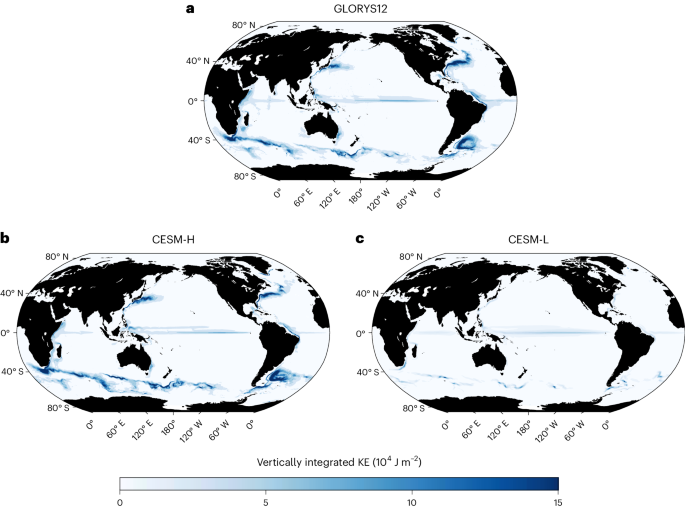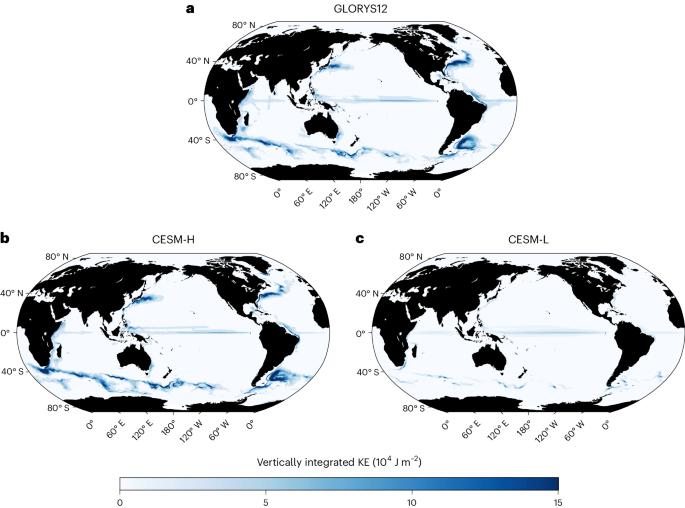A more quiescent deep ocean under global warming
IF 29.6
1区 地球科学
Q1 ENVIRONMENTAL SCIENCES
引用次数: 0
Abstract
The ocean is a magnificent reservoir of kinetic energy possessed by currents at diverse spatio-temporal scales. These currents transport heat and material, regulating the regional and global climate. It is generally thought that large-scale ocean circulations should become more energetic under global warming, especially in the ocean’s upper layer. However, using high-resolution global climate simulations, here we demonstrate that the total ocean kinetic energy is projected to be significantly reduced in a warming climate, despite overall acceleration of large-scale ocean circulations in the upper layer. This reduction is primarily attributed to weakened ocean mesoscale eddies in the deep ocean. Enhanced vertical stratification under global warming reduces the available potential energy stored in large-scale ocean circulations, diminishing its conversion into eddy kinetic energy. Our findings reveal a more quiescent deep ocean under global warming and suggest a crucial role of mesoscale eddies in determining the anthropogenic change of total ocean kinetic energy. Studies show climate change will alter the ocean, with increased surface layer kinetic energy. This work, using full ocean depth and high-resolution projections with a high-emission scenario, shows an overall ocean kinetic energy decrease due to a calmer deep ocean with weaker mesoscale eddies.


全球变暖下的深海更加平静
海洋是一个巨大的动能库,由不同时空尺度的洋流所拥有。这些洋流输送热量和物质,调节区域和全球气候。一般认为,在全球变暖的情况下,大尺度海洋环流的能量应该会增加,尤其是在海洋上层。然而,利用高分辨率全球气候模拟,我们在这里证明,尽管大尺度海洋环流在上层总体上加速,但在气候变暖的情况下,海洋总动能预计会显著下降。这种减少主要归因于深海中尺度漩涡的减弱。全球变暖导致垂直分层加剧,从而减少了大尺度海洋环流中储存的可用势能,降低了其转化为涡旋动能的能力。我们的研究结果表明,在全球变暖的情况下,深海更加平静,并表明中尺度漩涡在决定海洋总动能的人为变化方面起着至关重要的作用。
本文章由计算机程序翻译,如有差异,请以英文原文为准。
求助全文
约1分钟内获得全文
求助全文
来源期刊

Nature Climate Change
ENVIRONMENTAL SCIENCES-METEOROLOGY & ATMOSPHERIC SCIENCES
CiteScore
40.30
自引率
1.60%
发文量
267
审稿时长
4-8 weeks
期刊介绍:
Nature Climate Change is dedicated to addressing the scientific challenge of understanding Earth's changing climate and its societal implications. As a monthly journal, it publishes significant and cutting-edge research on the nature, causes, and impacts of global climate change, as well as its implications for the economy, policy, and the world at large.
The journal publishes original research spanning the natural and social sciences, synthesizing interdisciplinary research to provide a comprehensive understanding of climate change. It upholds the high standards set by all Nature-branded journals, ensuring top-tier original research through a fair and rigorous review process, broad readership access, high standards of copy editing and production, rapid publication, and independence from academic societies and other vested interests.
Nature Climate Change serves as a platform for discussion among experts, publishing opinion, analysis, and review articles. It also features Research Highlights to highlight important developments in the field and original reporting from renowned science journalists in the form of feature articles.
Topics covered in the journal include adaptation, atmospheric science, ecology, economics, energy, impacts and vulnerability, mitigation, oceanography, policy, sociology, and sustainability, among others.
 求助内容:
求助内容: 应助结果提醒方式:
应助结果提醒方式:


